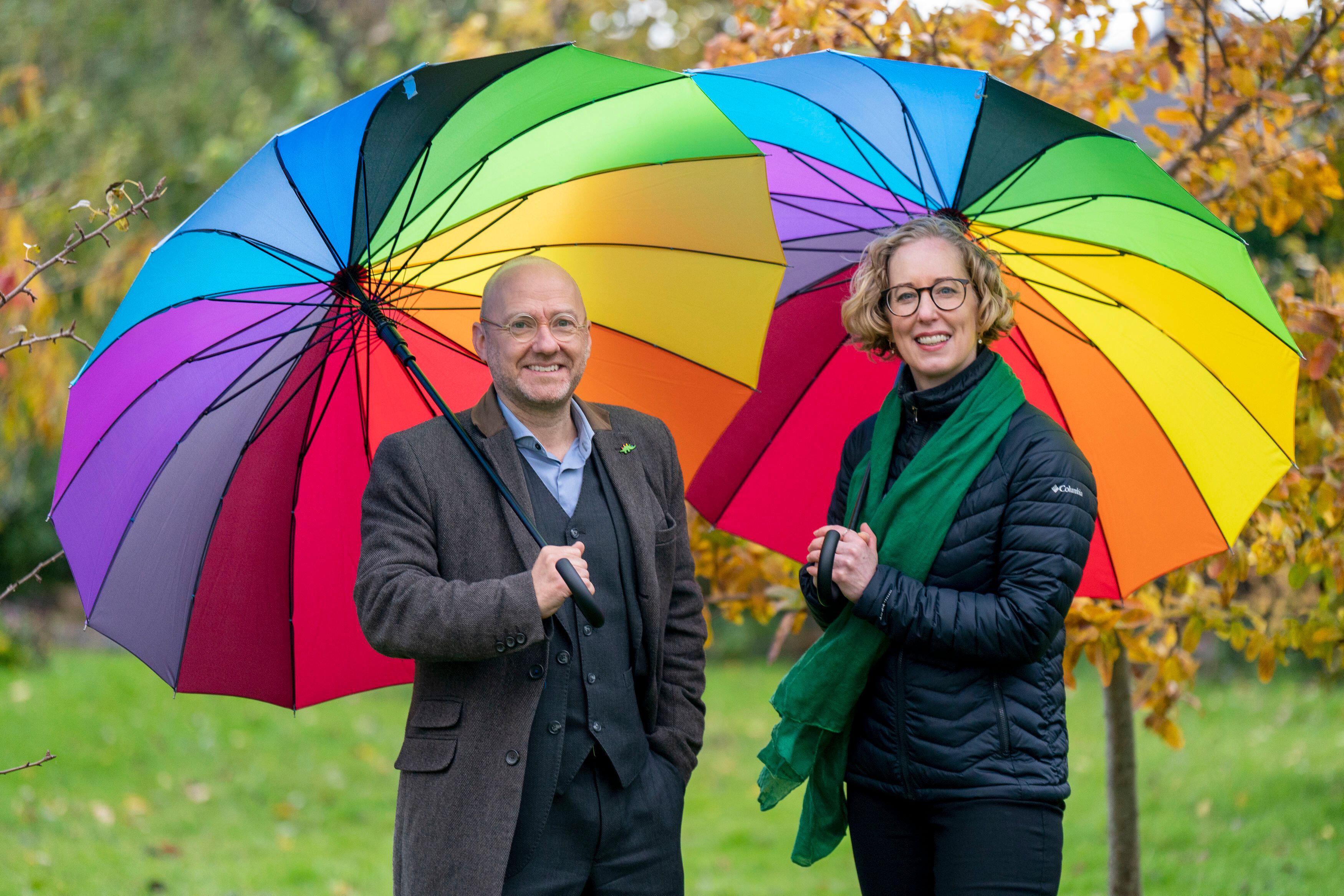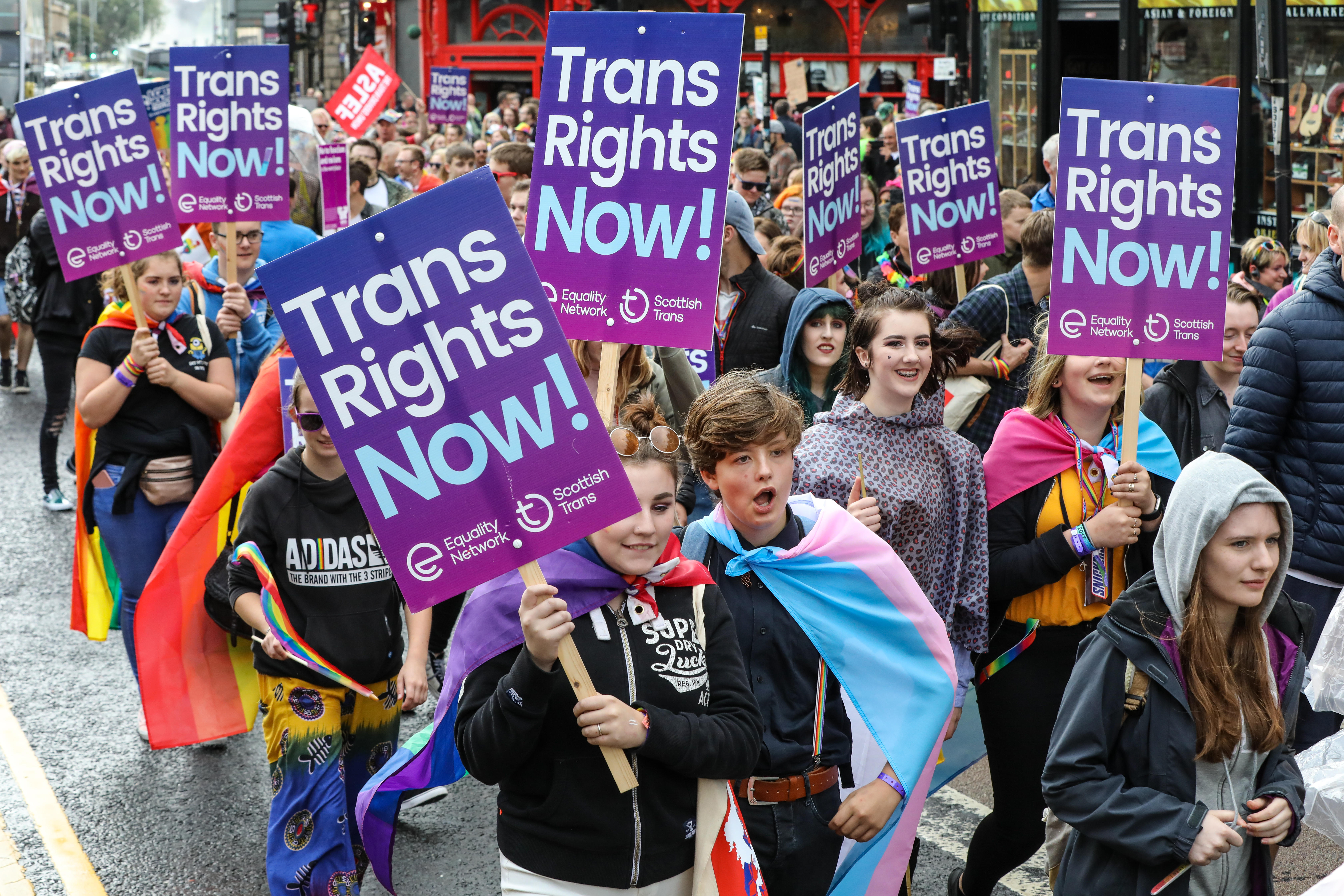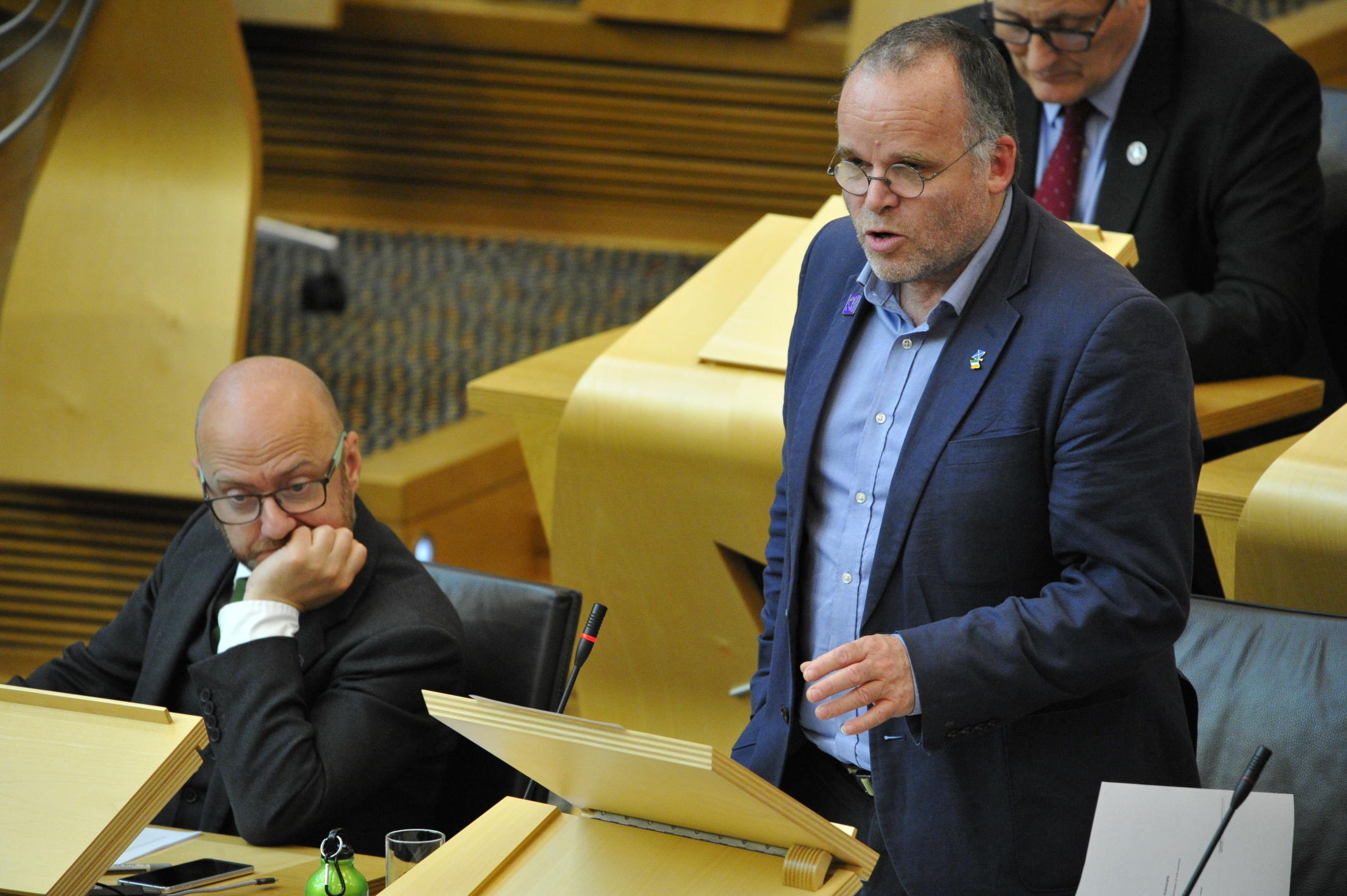Exclusive: Robin Harper calls for Scottish Greens leaders to go as trans rights splits party
Robin Harper led the Scottish Greens, then left the Scottish Greens. Now he’s told Holyrood he’ll likely never go back. And, as a group of women members and ex-members organise to counter what they call a “chilling atmosphere of censure and fear within the party” over gender identity, he says it’s time for the current leadership to go.
Scores of women – many of whom say they are too scared to speak out for fear of vilification – have formed the Scottish Green Women’s Declaration for Sex-Based Rights to oppose the party line on sex and gender.
They’ve spoken exclusively to Holyrood as they launch their pitch for change, with Harper – the UK’s first Green parliamentarian – amongst their backers.
“We have a ruling cabal,” Harper says. “About half of the MSPs form it. They don’t listen – they don’t want to listen – to reason, to the rest of the party, where there are differences of opinion.
“They have a real grip of the party. There are many, many party members who haven’t realised actually how far they have drifted towards being in total control.
“There needs to be an upwelling amongst members to replace the present leadership.”

Scottish Greens co-leaders Patrick Harvie and Lorna Slater | Alamy
Harper, the smiling ex-teacher with the trademark rainbow scarf, has become a vocal critic of the party he once helmed, publicly criticising its stance on gender recognition reforms and gender identity in general. Now the subject of a costly court challenge after a block by the UK Government on the grounds that it impinged on reserved laws, Scotland’s Gender Recognition Reform Bill had already been on the SNP agenda but was brought before the Scottish Parliament after the Greens made it a red line in the deal they made to shore up the minority administration. The move took the party into government for the first time and made its co-leaders, Patrick Harvie and Lorna Slater, junior ministers.
The legislation follows an unwavering commitment by Harvie, Slater and their party to advance transgender rights and uphold the human rights of all gender-diverse people. At its 2018 autumn conference, the party voted in favour of an emergency motion setting out unambiguous support for people of all genders and none. It stated that “trans women are women, trans men are men, and that all genders (or lack thereof) are inherently valid” and a refusal to “accept the gender determined by each individual” is transphobic and trans-exclusionary.
“The conference of the Scottish Green Party affirms that transphobic or trans-exclusionary individuals of any kind are not welcome as members of the Scottish Green Party,” the motion continued, and violations of the acceptance requirement would be “serious, actionable” offences under its complaints procedure.
It was under that rule that Harper was reported to the Scottish Greens conduct and complaints commitee, after what he says was a casual conversation with a local councillor over his plans to voice his “concerns about our gender legislation”, which was yet to be passed. The move left him “dumbfounded, hurt, confused and angry,” he says, and in August he wrote to Harvie to cancel his membership, saying the party had “lost the plot”.
Despite those criticisms he remains, he says, a “passionate champion of the environment”. It is a sentiment shared by the members and former members behind the Scottish Green Women’s Declaration for Sex-Based Rights, who have published their statement today. “There now exists a chilling atmosphere of censure and fear within the party, which affects not only free speech but free thought,” it says, and “women’s rights, based on the reality of biological sex, have been eroded within the SGP [Scottish Green Party]”. This ‘erosion’ has taken place too in wider society, the declaration states, with “extremely damaging” consequences for women and girls.
The declaration follows similar moves in the SNP and Labour, and is backed by around 40 SGP members, supporters and former members “who have resigned in frustration, or been forced out of membership, or have been expelled or suspended because of [their] commitment to the legitimacy of advocating for women’s sex-based rights”. Harper is amongst the founding signatories, as are several other men.

Crowds call for transgender rights | Alamy
It is released one week after Transgender Day of Remembrance, which marks the deaths of trans people around the world in violent circumstances and on which the SGP said “all politicians and governments must stand against prejudice and the scapegoating of trans people”. “The Scottish Greens stand firmly with our trans siblings and always will,” said the party’s equalities spokesperson Maggie Chapman MSP. “We must build a world where everyone can be comfortable and safe to live as the people they really are.”
While debate around sex, gender and identity continues, a series of legal cases have established that “gender-critical” beliefs – including the principles that sex is biological, individuals cannot change sex, and sex is distinct from gender identity – are protected under the UK-wide Equality Act, though expressions of those beliefs may not be, depending on how they affect the legal rights of others on the basis of their sex or gender reassignment.
In an eight-point list, the declaration asserts that “women and girls are subject to discrimination and oppression on the basis of their sex; that sex should not be confused with gender and that sex is a biological reality; that women and girls have the right to maintain their sex-based protections as set out in the Equality Act (2010), including female-only spaces, and that women have the right to refuse consent to males being in these spaces or males delivering intimate services to females”.
“Women and girls have the right to discuss policies which affect them without being abused, harassed or intimidated,” it goes on, and lesbians are “by definition women who are same-sex attracted”. “We reject all attempts to undermine or limit the rights of women to self-organise and we call on and expect the Scottish Green Party, along with the wider green movement, actively to support these essential freedoms,” the declaration states. “We are fully committed to the core values of the SGP to address the climate and ecological emergencies and transform society for the benefit of all and the planet as a whole.
“We know that globally women, as a sex, are disproportionately affected by climate change and environmental degradation and that their empowerment is essential to our work as environmentalists.”
One woman, who asked not to be named, said the Scottish Greens’ internal handling of the resignation of former MSP Andy Wightman from the party in December 2020 had contributed to the “chilling effect” on those with “sincere motives” for questioning policy on gender. Wightman claimed the party had become “censorious” and “intolerant” of discussion around potential conflict between women’s rights and trans rights. The party has “continued to shut down free speech by disciplining and expelling members and refusing to engage with inconvenient facts,” the woman said.

Andy Wightman (right) with Patrick Harvie | Alamy
“Party members who wish to steer a middle course through this minefield of conflicting rights and ideologies have faced a dilemma. Should they resign over this single issue which also divides members of all other political parties? Or, when their principal concerns align with core Green Party values, should they continue to give their support and try to influence party policy in a more tolerant direction?
“Many in the latter group are losing hope in the face of the takeover of many key positions by militant trans activists.”
Another said she was “reprimanded” for using the term “biological male” in a debate and there is now “next to no one left in [her] branch because of all this”.
“It is very disappointing to see a party of science and environment now being ruled by the gender ideology minority, and prepared to lose so many activists to an argument about self-identification while the world burns,” she said.
A third called the transpositivity motion “divisive, offensive, bullying, unjust and sexist” and that while she can “accept the gender determined by each individual”, she “cannot accept that anyone can change their biological sex”.
“I am not transphobic,” she said. “What we need is open, non-confrontational debate between trans supporters and those of us who believe in the immutability of biological sex and support human rights in general and women’s rights in particular.”
“I am concerned to be devoting energy and resources to the urgent and massive challenge of climate breakdown, rather than wasting scarce resources on a delusional cult which harms young people and women and undermines larger collective freedoms,” said another.
While the green movement values work across borders, feelings over gender identity issues are running so high that the Scottish Greens suspended formal ties with the Green Party of England and Wales last year. Members in Scotland said office-bearers in the sister party had engaged in “transphobic rhetoric and conduct”.

Robin Harper in the Scottish Parliament | Anna Moffat
Harper, who has served on a number of boards since retiring as an MSP, says the declaration shows SGP women are now “split down the middle”.
“Those of us in this group who are still in the Scottish Green Party are doing their best to persuade our leadership to change their minds, I think they are going to have a very difficult job now,” he says, “but it’s got to be done now if we are to have any chance of things improving on women’s rights and refocusing the political agenda onto the environment and the climate.
“We are in a situation where we just have to grit our teeth and brave the howls of offence and transphobia from the largely men who are leading in all of this, and we have to protect the rights of young people. We know that a very, very small group of people are going to be very disturbed by it. My feeling is that they don’t need to be. It should not be beyond the wit of men and women to sit down and hammer out some of the problems.
“Nobody likes to move from a position of being undeniably popular to being undeniably unpopular within a few weeks,” Harper said on criticising then leaving the Greens.
“The advantage for me is I have had very little contact with the party since I retired from politics. Being too political would have compromised me as being on the board of the National Trust for Scotland and two wildlife organisations. It was much safer for me to be away from politics. I’m back into politics in a big way now.
“I have resolved it in my own mind that it’s unlikely that I will want to rejoin the party in my lifetime, but I have a political commitment to serving in one way or another the body politic by being political that is undimmed.”
Holyrood asked the Scottish Greens to repond to the emergence of the Scottish Green Women’s Declaration For Sex-Based Rights, and in particular the claims that there is a “chilling atmosphere of censure and fear” in the party around issues of gender identity and that a ruling “cabal” of MSPs has made the party less democratic, with a new leadership now necessary.
Responding, a spokesperson for the Scottish Greens said: “No such group is known to nor affiliated to the Scottish Greens. We support the rights of our trans siblings and stand against all forms of prejudice.”
Holyrood Newsletters
Holyrood provides comprehensive coverage of Scottish politics, offering award-winning reporting and analysis: Subscribe